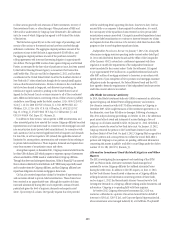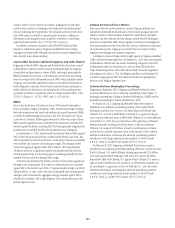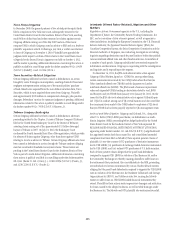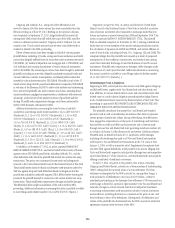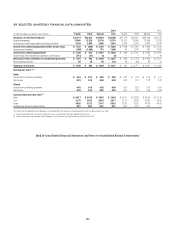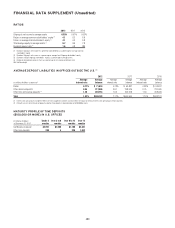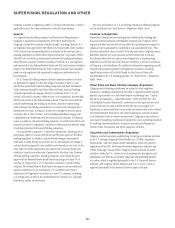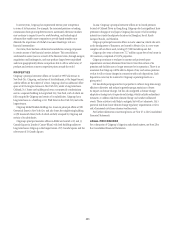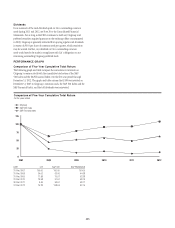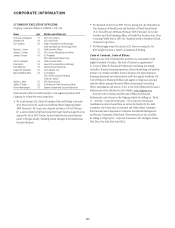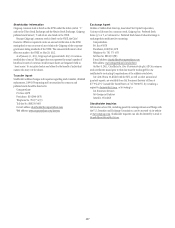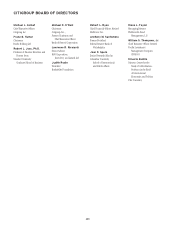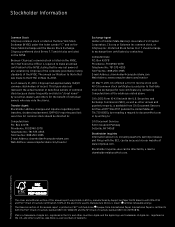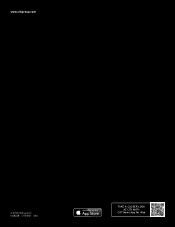Citibank 2012 Annual Report Download - page 314
Download and view the complete annual report
Please find page 314 of the 2012 Citibank annual report below. You can navigate through the pages in the report by either clicking on the pages listed below, or by using the keyword search tool below to find specific information within the annual report.292
The Office of Foreign Assets Control (OFAC) has been aware of the
requirement for financial institutions operating within a particular country
to participate in these local government-run clearing and exchange networks
(including the participation of these Citi branches in such networks), despite
the fact that certain banks that have been designated for sanctions by OFAC
based on their ties to Iran and involvement in certain activities (OFAC
Designated Banks) also participate in these networks.
Beginning in 2007, Citi, on behalf of its Citibank UAE branches, engaged
with OFAC on a series of license applications. In October 2011, OFAC granted
a license providing relief for check-clearing transactions involving Bank
Melli and Bank Saderat, two OFAC Designated Banks participating in the
UAE network, and in October 2012, OFAC renewed the original license and
expanded its scope to encompass ATM and POS transactions (UAE License).
Citi also engaged with OFAC and filed license applications between 2007
and 2011 on behalf of its Citibank Bahrain, Citibank Lebanon and Citibank
Venezuela branches; these applications are pending with OFAC.
Prior to receiving the UAE License, during 2012, Citibank UAE processed
approximately 5,350 ATM and POS transactions (or approximately 0.3%
of all ATM and POS transactions for Citibank UAE during this time period)
involving Bank Melli and Bank Saderat. These transactions resulted in
approximately $2,200.00 gross revenues and approximately $1,100.00 net
income to Citi.
During 2012, Citibank Bahrain processed approximately 8,800 domestic
check and ATM transactions (or approximately 2.1% of all domestic check
and ATM transactions for Citibank Bahrain during 2012) involving Future
Bank, an OFAC Designated Bank. The domestic check transactions resulted
in no revenues or net income to Citi. The ATM transactions resulted in
approximately $250.00 gross revenues and approximately $125.00 net
income to Citi.
During 2012, Citibank Lebanon processed approximately 180 domestic
check transactions (which in aggregate, equaled approximately $890,000.00)
involving Bank Saderat, an OFAC Designated Bank. The transactions resulted
in less than $10.00 in gross revenue and net income to Citi.
During 2012, Citibank Venezuela processed a total of four domestic
check transactions (which in aggregate, equaled approximately $1,000.00)
involving Banco Internacional de Desarrollo, an OFAC Designated Bank. The
transactions resulted in no revenues or net income to Citi.
In addition to the exchange network transactions described above, Citi,
through its subsidiary in Germany (Citi Germany AG), processed one wire
transfer in early 2012 that involved Europaisch Iranische Handlesbank
(EIH), an OFAC Designated Bank. The transfer was originated by the Central
Bank of Germany (Bundesbank) from an EIH account in favor of a customer
of Citi Germany AG. The transfer was licensed by the Bundesbank, which
directed that the transfer be made. The transfer was also permissible under
U.S. law pursuant to an exemption for informational materials under OFAC’s
Iran sanctions program and involved a German subsidiary, which was
not subject to the Iran sanctions program at the time of the transfer. This
transaction did not generate any revenue for Citi.
Further, in 2011, a German court ordered the London branch of Citibank,
N.A. to transfer a payment, previously blocked by Citi, to Bank Melli through
the Bundesbank. The transfer was permissible under EU law and did not
require regulatory licenses in either England or Germany, but required
OFAC authorization, which was granted to Citi in 2011. The blocked funds
were transferred in 2011 pursuant to the OFAC license, but a small amount
of accrued interest related to the 2011 payment was made during 2012,
pursuant to the same OFAC license. This transaction did not generate any
revenue for Citi.
CUSTOMERS
In Citigroup’s judgment, no material part of Citigroup’s business depends
upon a single customer or group of customers, the loss of which would have
a materially adverse effect on Citi, and no one customer or group of affiliated
customers accounts for at least 10% of Citigroup’s consolidated revenues.
COMPETITION
The financial services industry, including each of Citigroup’s businesses,
is highly competitive. Citigroup’s competitors include a variety of other
financial services and advisory companies such as banks, thrifts, credit
unions, credit card issuers, mortgage banking companies, trust companies,
investment banking companies, brokerage firms, investment advisory
companies, hedge funds, private equity funds, securities processing
companies, mutual fund companies, insurance companies, automobile
financing companies, and internet-based financial services companies.
Citigroup competes for clients and capital (including deposits and
funding in the short- and long-term debt markets) with some of these
competitors globally and with others on a regional or product basis.
Citigroup’s competitive position depends on many factors, including the
value of Citi’s brand name, reputation, the types of clients and geographies
served, the quality, range, performance, innovation and pricing of products
and services, the effectiveness of and access to distribution channels,
technology advances, customer service and convenience, effectiveness
of transaction execution, interest rates and lending limits, regulatory
constraints and the effectiveness of sales promotion efforts. Citigroup’s ability
to compete effectively also depends upon its ability to attract new employees
and retain and motivate existing employees, while managing compensation
and other costs. See “Risk Factors—Business and Operational Risks” above.



